Packed with fiber and prebiotics, sea moss can help improve digestion, relieve constipation, soothe gut inflammation, and enhance nutrient absorption. With its impressive nutrient profile and gut-loving properties, sea moss is a great addition to a balanced diet for optimal health.
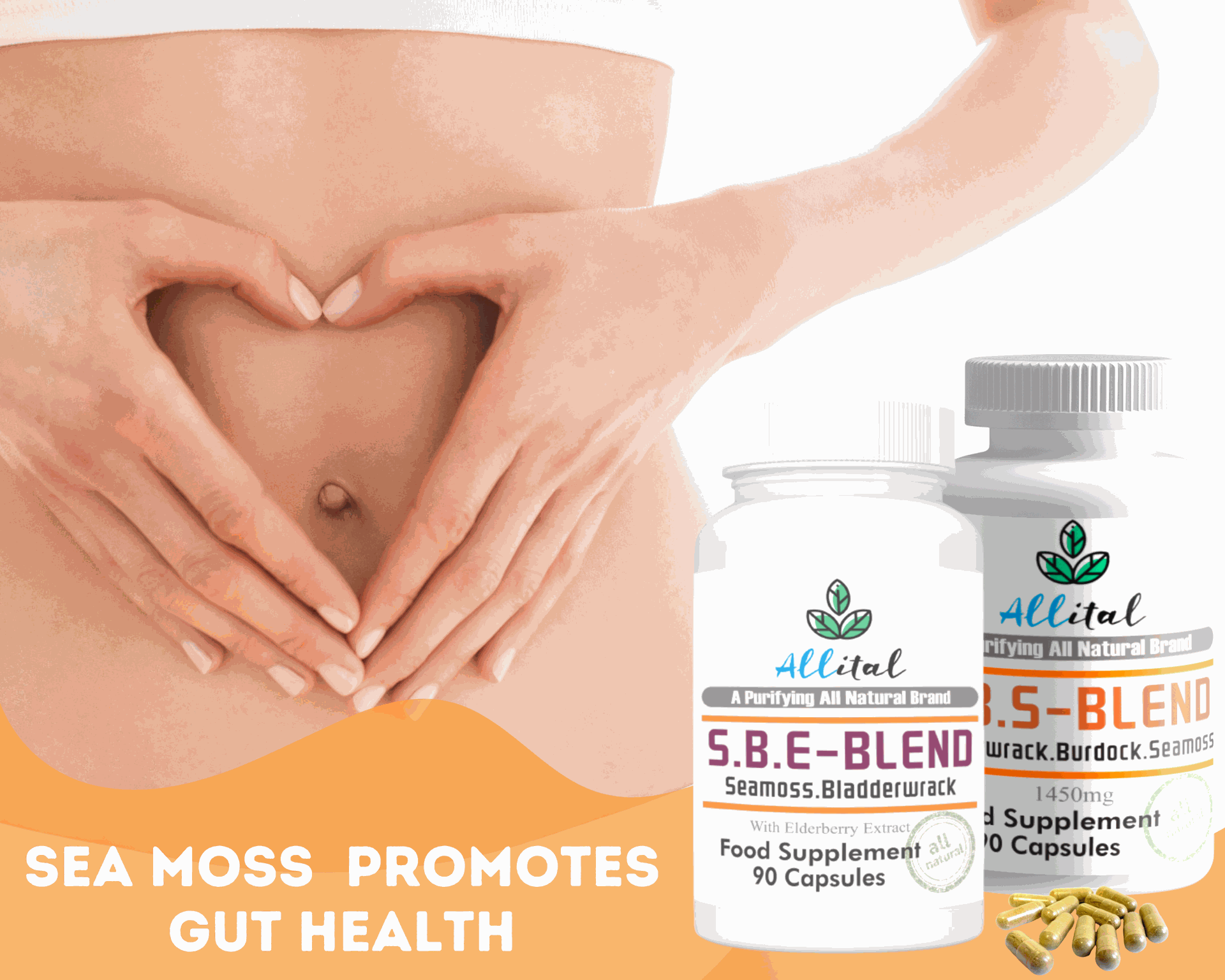
What is Sea Moss?
Sea moss, also known as Irish moss, is a type of red algae that grows in the Caribbean and along the coasts of North America and Europe. It has been used for centuries for its medicinal properties and as a food source. Sea moss is a nutritional powerhouse and offers numerous health benefits, especially for gut health.
Sea Moss Benefits
Here are some of the overall health benefits of sea moss:
Boosts Immune System: Sea moss contains prebiotic fibers that help to promote the growth of good bacteria in the gut, boosting the immune system. It also contains potassium iodide, which is known to help dissolve mucus in the lungs and relieve respiratory issues.
Supports Thyroid Health: Sea moss is a natural source of iodine, which is essential for thyroid function. It helps to regulate the thyroid gland and prevent iodine deficiency, which can lead to thyroid disorders.

Promotes Skin Health: Sea moss is rich in vitamins and minerals that nourish the skin, including vitamin C, calcium, and magnesium. It also has anti-inflammatory properties that help to soothe and heal skin irritations.
Aids in Digestion: Sea moss is a natural source of carrageenan, a type of fiber that can help to regulate digestion and prevent constipation. It also has a soothing effect on the digestive tract, reducing inflammation and irritation.
Supports Joint Health: Sea moss is rich in collagen, a protein that is essential for joint health. It helps to reduce inflammation in the joints, preventing arthritis and other joint-related conditions.
How Does Sea Moss Promote Gut Health?
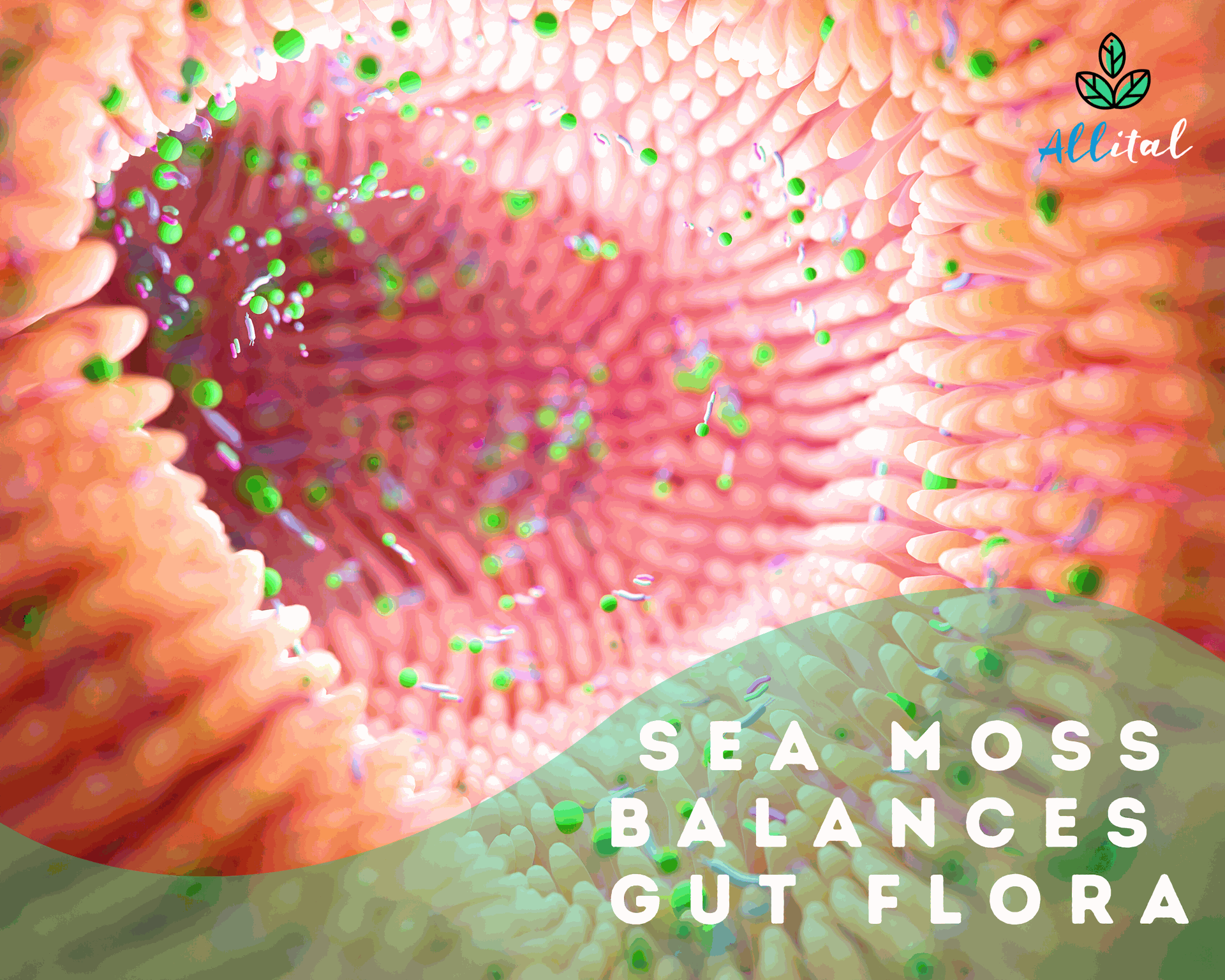
Here are some of the ways sea moss can benefit gut health:
Improves Digestion: Sea moss is rich in fiber, which helps to regulate the digestive system. The mucilage in sea moss also helps to soothe the digestive tract, reducing inflammation and promoting overall gut health.
Boosts Immunity: Sea moss contains prebiotic mucilage, which helps to boost the immune system. It also has antimicrobial properties that help to fight against harmful bacteria, viruses, and fungi.
Helps to Heal the Gut: Sea moss is rich in amino acids, which are essential for repairing and rebuilding damaged gut lining. It also contains vitamins and minerals that support gut health.
Reduces Inflammation: Sea moss has anti-inflammatory properties that help to reduce inflammation in the gut. Chronic inflammation in the gut can lead to a range of health issues, including inflammatory bowel disease (IBD).
Balances Gut Flora: Sea moss helps to balance the gut flora, which is essential for maintaining a healthy digestive system. An imbalance in gut flora can lead to digestive issues and a range of health problems.
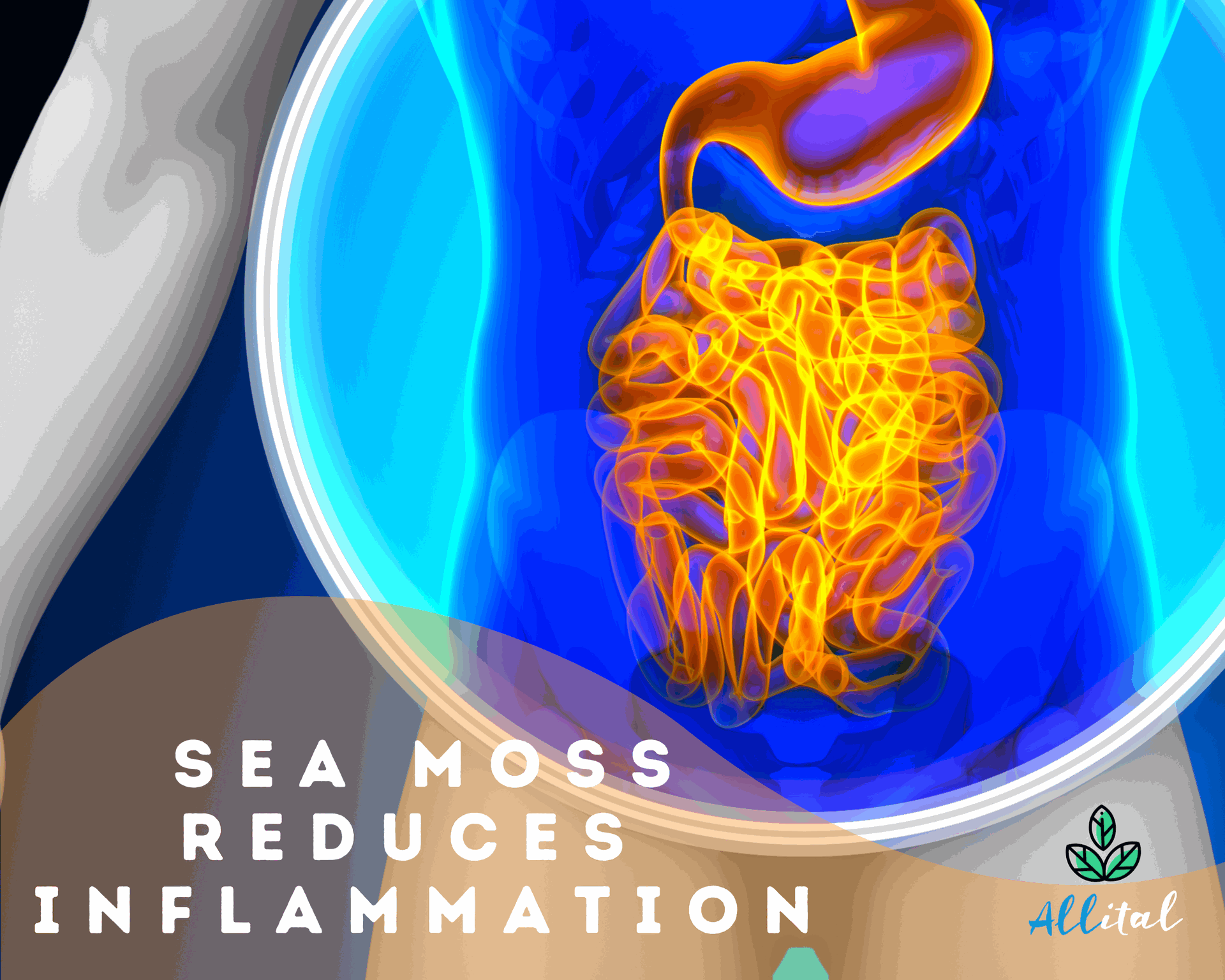
Sea Moss Nutrients Benefit Gut Health
Prebiotic fiber: Sea moss contains prebiotic fiber that can help feed the beneficial bacteria in the gut, promoting a healthy balance of gut microbiota.
Soluble fiber: The mucilage in sea moss is a type of soluble fiber that can help soothe and protect the gut lining.
Iodine: Sea moss is a good source of iodine, a nutrient that supports thyroid function and can impact gut health.
Vitamin C: Sea moss is high in vitamin C, an antioxidant that supports immune function and can help protect the gut lining.
Vitamin K: Sea moss contains vitamin K, a nutrient that can help regulate inflammation in the gut.
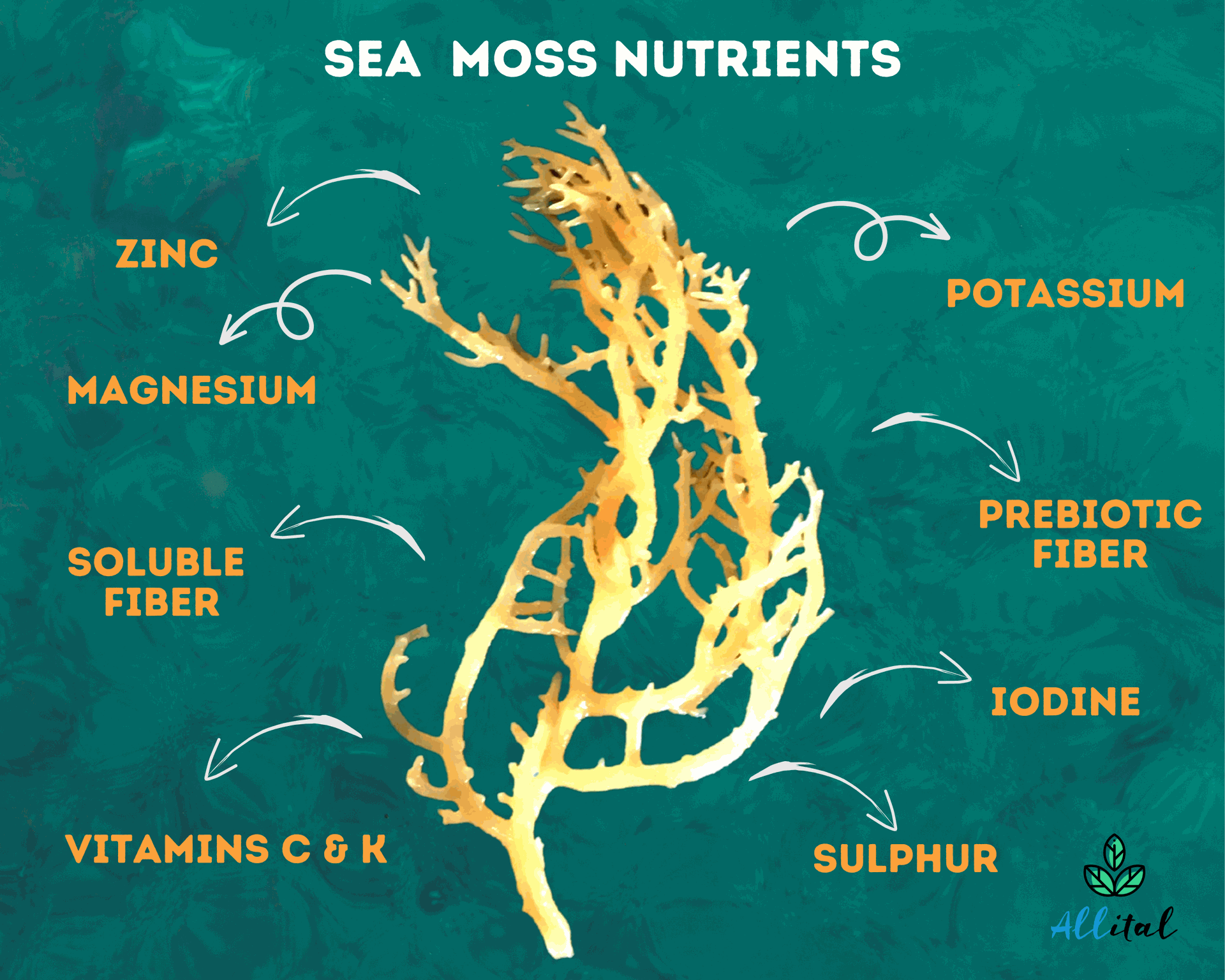
Calcium: Sea moss is a good source of calcium, a mineral that can promote healthy digestion.
Magnesium: Sea moss contains magnesium, a mineral that can help relax the muscles of the digestive tract and promote regular bowel movements.
Zinc: Sea moss is rich in zinc, a nutrient that can support immune function and help protect the gut lining.
Iron: Sea moss is a good source of iron, a mineral that can help prevent anemia, a condition that can impact gut health.
Potassium: Sea moss contains potassium, a mineral that can help regulate fluid balance in the gut and promote healthy digestion.
Incorporating Sea Moss into Your Diet

There are various ways to incorporate sea moss into your diet, including:
Adding to Smoothies and Juices: Sea moss can be blended into smoothies and juices, adding a nutritional boost.
Used as a Thickening Agent: The mucilage in sea moss makes it an ideal thickening agent for soups, stews, and sauces.
Used in Desserts: Sea moss can be used to make desserts, including pudding and ice cream.
Taking Sea Moss Supplements: Sea moss capsules, tinctures, gummies and powders are all easy and convenient ways to help support a healthy gut. Ensure you purchase these products from a reputable supplier and if you have any pre-existing conditions or are taking any medications, it's important to consult with a healthcare professional before making any significant changes to your diet or supplement routine.
Gut Loving Sea Moss Recipes

Here are a few sea moss recipes that can promote a healthy gut:
Sea Moss Smoothie: Blend together 1 cup of almond milk, 1/2 cup of fresh or frozen berries, 1 ripe banana, 1 tablespoon of honey or agave syrup, and 1 tablespoon of sea moss gel. This smoothie is packed with gut-healthy nutrients and is a great way to start your day.
Sea Moss Pudding: In a blender, combine 1 cup of almond milk, 1 ripe banana, 1 tablespoon of honey or agave syrup, 1 teaspoon of vanilla extract, and 1 tablespoon of sea moss gel. Pour the mixture into a saucepan and heat over medium heat, stirring constantly, until the mixture thickens into a pudding-like consistency. Chill in the fridge for at least an hour before serving.
Sea Moss Salad Dressing: In a blender, combine 1/2 cup of olive oil, 1/4 cup of apple cider vinegar, 1 tablespoon of honey or agave syrup, 1 tablespoon of sea moss gel, and a pinch of sea salt. Blend until smooth and creamy. Drizzle over your favorite salad for a gut-healthy meal.
Sea Moss Soup: In a pot, sauté diced onion, garlic, and ginger in a tablespoon of olive oil until the onions are translucent. Add 4 cups of vegetable broth and 1 cup of diced vegetables (such as carrots, celery, and sweet potato) and simmer until the vegetables are tender. Add 1 tablespoon of sea moss gel and stir until well combined. Season with salt and pepper to taste.
These recipes are just a few examples of how you can incorporate sea moss into your diet to promote gut health. However, it's important to consult with a healthcare professional if you have any pre-existing medical conditions or are taking medications before making any significant changes to your diet or supplement routine.
Tips for Purchasing Sea Moss for Gut Health
If you're interested in purchasing sea moss for gut health, here are a few tips to keep in mind:
Choose wildcrafted sea moss: Wildcrafted sea moss is harvested directly from the ocean and is considered to be more nutrient-dense than farmed sea moss. Look for sea moss that is labeled as wildcrafted to ensure that you're getting a high-quality product.
Check for cleanliness: When purchasing sea moss, make sure it has been properly cleaned and prepared for consumption. Look for sea moss that is free of debris, sand, and other contaminants.
Look for organic sea moss: While sea moss is not typically grown with pesticides, choosing organic sea moss can help ensure that it has been grown and harvested in a sustainable and environmentally-friendly manner.
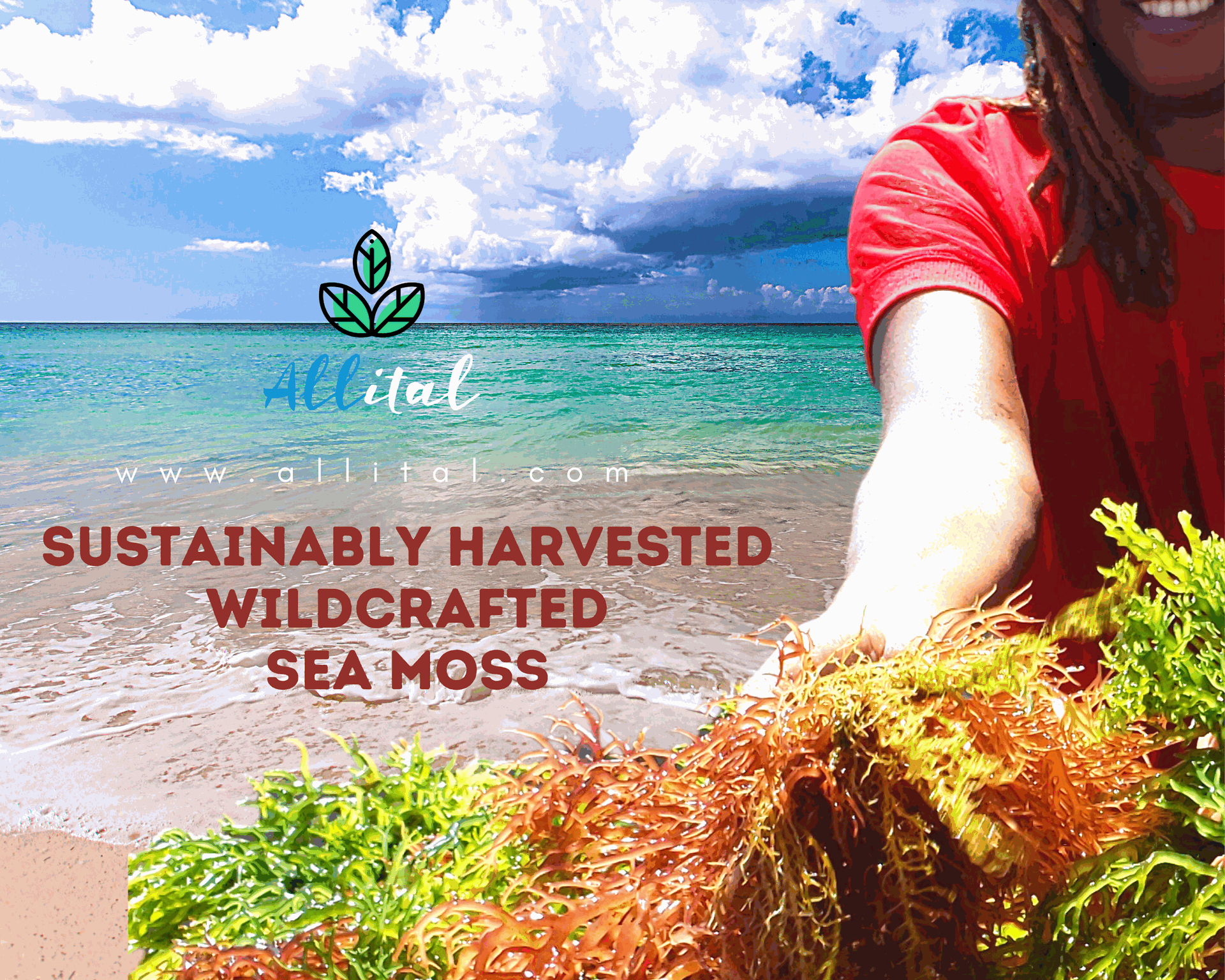
Check the color and texture: Sea moss should be a dark brown or purple color and should have a slightly salty smell. It should have a firm, gel-like texture and should not feel slimy or slimy when touched.
Choose reputable brands: When purchasing sea moss, choose brands that have a reputation for quality and transparency. Look for brands that provide information about where the sea moss was sourced, how it was harvested and prepared.
By following these tips, you can help ensure that you're purchasing high-quality sea moss that can promote gut health and overall wellness.
Conclusion
Sea moss is a powerful superfood that offers numerous benefits for gut health. Its high fiber content, prebiotic mucilage, and anti-inflammatory properties make it an ideal food for promoting gut health. Try incorporating sea moss into your diet and experience the benefits for yourself!

FAQs: Sea Moss and Gut Health
How does sea moss benefit gut health?
Sea moss is rich in fiber, which is essential for maintaining healthy digestion. It can also help to soothe inflammation in the gut and improve overall gut health.
Can sea moss help with constipation?
Yes, sea moss can help to relieve constipation due to its high fiber content. It can also help to soften stool and promote regular bowel movements.
Does sea moss contain probiotics?
No, sea moss does not contain probiotics. However, it does contain prebiotics, which are important for nourishing the beneficial bacteria in your gut.
Is sea moss safe for everyone to consume?
Sea moss is generally safe for most people to consume. However, if you have a history of digestive issues or are pregnant or breastfeeding, it is best to consult with a healthcare professional before adding sea moss to your diet.
For more FAQs on Sea Moss and Gut health read this BLOG.
REFERENCES:
-
Hwang, J., Yadav, D., Lee, P. C. W., & Jin, J-O. (2021). Immunomodulatory effects of polysaccharides from marine algae for treating cancer, infectious disease, and inflammation. Phytotherapy Research, 36(3), 921-936. https://doi.org/10.1002/ptr.7348
Peter P.A. Smyth, (2021) “Iodine, Seaweed, and the Thyroid” https://www.ncbi.nlm.nih.gov/pmc/articles/PMC8077470/
Valentina Jesumani et al., “Potential Use of Seaweed Bioactive Compounds in Skincare-A Review,” Marine drugs (2019), https://www.ncbi.nlm.nih.gov/pmc/articles/PMC6950024/.
Liu, J., Kandasamy, S., Zhang, J., Kirby, C. W., Karakach, T., Hafting, J., Critchley, A. T., Evans, F., & Prithiviraj, B. (2015). Prebiotic effects of diet supplemented with the cultivated red seaweed Chondrus crispus or with fructo-oligo-saccharide on host immunity, colonic microbiota and gut microbial metabolites. BMC complementary and alternative medicine, 15(1), 279. https://www.ncbi.nlm.nih.gov/pmc/articles/PMC4535385/
-
Clark, K. L., Sebastianelli, W., Flechsenhar, K. R., Aukermann, D. F., Meza, F., Millard, R. L., Deitch, J. R., Sherbondy, P. S., & Albert, A. (2008). 24-Week study on the use of collagen hydrolysate as a dietary supplement in athletes with activity-related joint pain. Current medical research and opinion, 24(5), 1485-1496. doi: 10.1185/030079908x291967. Epub 2008 Apr 15. https://pubmed.ncbi.nlm.nih.gov/18416885/
Lomartire, S., Marques, J.C., & Gonçalves, A.M.M. (2021). An overview of the health benefits of seaweed consumption. Marine Drugs, 19(6), 341 https://www.mdpi.com/1660-3397/19/6/341
Shannon, E., Conlon, M., & Hayes, M. (2021). Seaweed Components as Potential Modulators of the Gut Microbiota. Marine drugs, 19(7), 358. https://doi.org/10.3390/md19070358
Umu, Ö. C. O., Rudi, K., & Diep, D. B. (2017). Modulation of the gut microbiota by prebiotic fibres and bacteriocins. Microbial Ecology in Health and Disease, 28(1), 1348886. https://doi.org/10.1080/16512235.2017.1348886
-
Natalya N. Besednova et al., “Extracts and Marine Algae Polysaccharides in Therapy and Prevention of Inflammatory Diseases of the Intestine” (2020), https://www.ncbi.nlm.nih.gov/pmc/articles/PMC7345783/
Gomez-Zavaglia, A., Prieto Lage, M. A., Jimenez-Lopez, C., Mejuto, J. C., & Simal-Gandara, J. (2019). The Potential of Seaweeds as a Source of Functional Ingredients of Prebiotic and Antioxidant Value. Antioxidants, 8(9), 406. doi: 10.3390/antiox8090406. https://www.ncbi.nlm.nih.gov/pmc/articles/PMC6770939/
Brown, E. M., Allsopp, P. J., Magee, P. J., Gill, C. I., & McDougall, G. J. (2014). Seaweed and human health. Nutrition reviews, 72(3), 205-216. https://doi.org/10.1111/nure.12091
Wijesinghe, W. A. J. P., Jeon, Y. J. (2012). Health benefit of seaweed and its constituents. Nutrients, 4(10), 497-508. doi: 10.3390/nu4100497. https://www.ncbi.nlm.nih.gov/pmc/articles/PMC7345263/
FDA DISCLAIMER:
The statements made within this website have not been evaluated by the Food and Drug Administration. These statements and the products of this company are not intended to diagnose, treat, cure or prevent any disease.
Sea Moss: The Gut-Loving Sea Vegetable